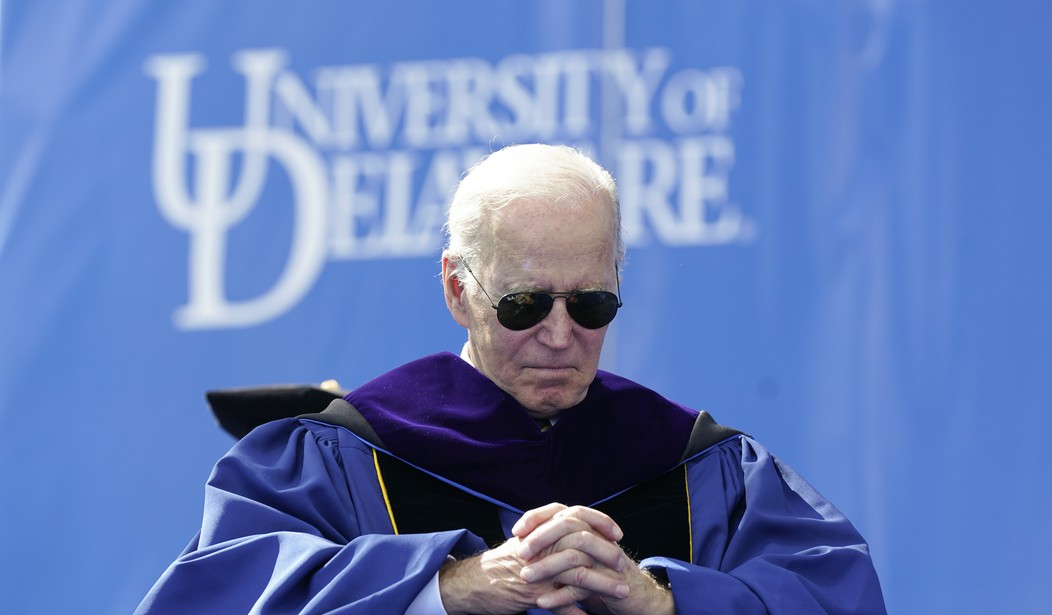The question mark in the headline is no typo. Should conservatives celebrate the apparent consolidation by the Supreme Court of two extant challenges to Joe Biden’s student-loan forgiveness plan? The answer: Yes. Er … probably. Maybe.
Earlier today, the Supreme Court refused to stay the ruling on the merits of a challenge to Biden’s Academia bailout in Texas. However, the court did agree to hear the Department of Education’s appeal of the ruling by converting the stay request into a petition for cert:
Consideration of the application for stay presented to Justice Alito and by him referred to the Court is deferred pending oral argument. The application for stay is also treated as a petition for a writ of certiorari before judgment, and the petition is granted. The parties are directed to brief and argue the following questions: (1) Whether respondents have Article III standing; and (2) Whether the Department’s plan is statutorily authorized and was adopted in a procedurally proper manner.
The Clerk is directed to establish a briefing schedule that will allow the case to be argued in the February 2023 argument session.
This presents a number of curiosities. At least at face value, the court now has taken up two cases in which lower courts had blocked (Eighth Circuit) or flat-out ended (Fifth Circuit) Biden’s unconstitutional giveaway. Remarkably, the court is taking and consolidating these cases even without a conflict between two different circuits, an unusual step in itself. The justices could have kept the status quo by just ignoring the appeals and allowing the program to die, especially in the case from Texas that the court added to its docket today. Their interest in hearing arguments at least leaves the possibility that the court may consider reversing the lower courts, at least on standing for the earlier stays and vacatur.
If that was what the court wanted, though, then the question for argument would likely have been limited to just the standing issue. If the Texas court erred in its ruling on standing — by which Judge Mark Pittman then consolidated the phases and went directly to ruling on the merits — that alone would overturn the decision and let the Supreme Court off the hook for anything else, at least for now. The new Republican-controlled House of Representatives can be expected to file suit to block the program after the start of the next session, after all, and its standing in this regard would be unassailable.
But the court didn’t limit the argument to standing. They want to also hear argument on Biden’s statutory claims via the HEROES Act and the administration’s adherence (or lack thereof) to the Administrative Procedure Act (APA). Needless to say, Biden and his team have no winning argument on the APA, having made up the rules and changed them on the fly without any of the requisite comment periods and review. Their reliance on the HEROES Act is only somewhat less specious, for that matter. And while that doesn’t explicitly touch on the horrendous violation of the Article I branch’s exclusive power of the purse, it leads there inevitably, as Pittman concluded in this case.
So why consolidate two cases where there is no circuit split, and where one side argues standing while the other the merits … and the court wants to hear both? Best guess is that when Alito referred this to the whole court, the justices split on the standing issue and perhaps on the merits as well. Either that, or some justices — and remember, it only takes four to grant cert — saw the issue as a violation so egregious that it required the Supreme Court to settle it forcefully.
For now, though, all we can do is speculate. None of the justices issued any opinion related to this order, neither in support or in opposition to it. Maybe all nine want to weigh in on the questions of standing or the merits or on both. In a best-case scenario, the court would finally address the gap in standing which occurs when the executive branch grossly exceeds its constitutional limits but Congress refuses to check it out of political expediency. It would be salutary to get a broader scope of standing for those kinds of constitutional abuses of power, but then again, it would also be salutary for leaders in Congress to defend the Constitution rather than cheer imperial presidencies as long as the emperor feeds their hobby horses.
Finally, one observation on the timing. The Supreme Court ordered the clerk to schedule this for oral arguments in February while refusing to stay any of the lower court actions that have blocked the program. If a standing issue exists, the incoming Republican House can fix that by filing its own suit over Article I and APA violations ASAP. Let’s hope that the next Speaker makes that a top priority … whomever it is.








Join the conversation as a VIP Member